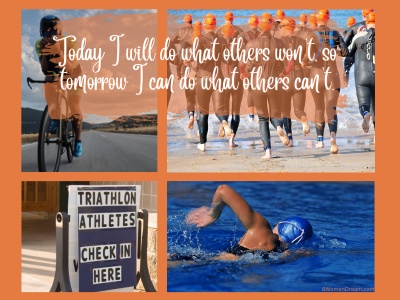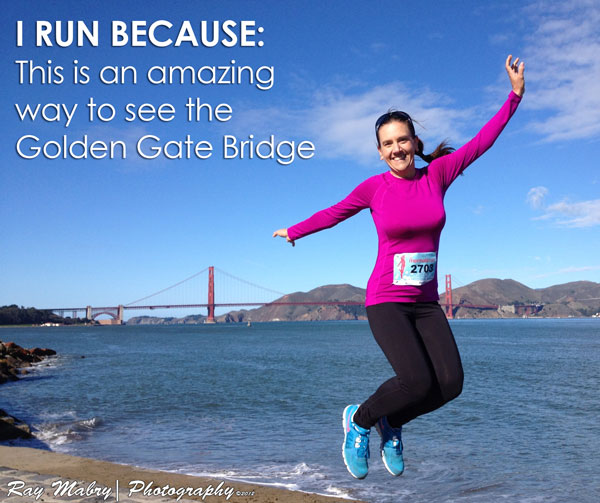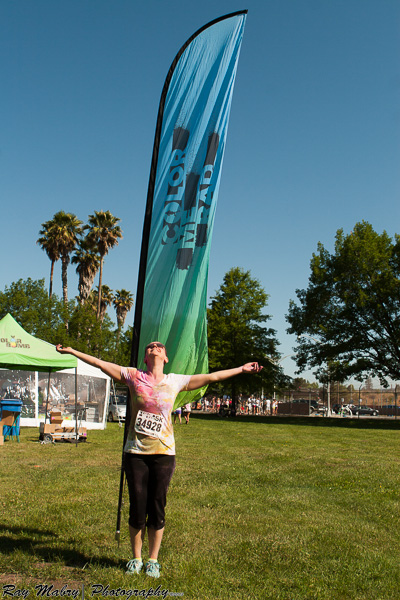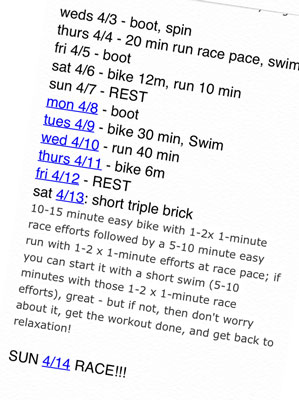Last updated on April 12th, 2023 at 11:49 am
 Sitting on the couch, surrounded by three books on triathlon training, I started to panic. My big dream fitness goal, which I had put out there to everyone as my huge goal for the year, was now only 10 weeks away.
Sitting on the couch, surrounded by three books on triathlon training, I started to panic. My big dream fitness goal, which I had put out there to everyone as my huge goal for the year, was now only 10 weeks away.
Around hour three of trying to put the last phase of my training plan in place, I understood why people hire a coach to help them work out and schedule rest between running, cycling, and swimming. Who’s stupid idea was this?
Mine. All mine.
Complete my first triathlon by my birthday
Little did I know there really aren’t that many triathlons in Northern California before June. There’s even one just after my birthday in the San Francisco Bay Area. A promise is a promise, so I tracked one down just 10 weeks away.
When my mouse hit the confirm button on the triathlon sign-up page, my favorite quote began to repeat in my head.
“Don’t Panic!” ― Douglas Adams, The Hitchhiker’s Guide to the Galaxy
The reality that this race was in 10 weeks increased my heart rate. There are three official distances to any triathlon race, and the distance I picked is somewhat sane for a beginner. I’ve had conversations with friends and family that go over the details of a triathlon. The funny thing is that the information has no context. What does a 750-meter open-water swim mean to someone who doesn’t swim regularly? Just because they don’t understand the work involved doesn’t mean their support is any less important.
I was stretching at my twice-daily exercise boot camp, and one of my workout buddies said, “I don’t know how you find the time!” Working boot camp time into my schedule has been tough this past month. There’s my husband’s photography business I help with, my son’s schedule, my new project launches, and worrying about friends and family going through stuff.
Extra training is exhausting.
I have also added cycle training and weekly performance swimming class by triathlon coach Rick Niles. I’ve found a new level of tiredness. The good news is that I sleep well! Unfortunately, I will typically start drifting off around 8:00 p.m., when I typically like to work on my many other dream projects. That’s when the dream guilt starts to settle in. I know I am losing momentum on other dreams because of this training, but I am also committed to this particular dream achievement.
Guilt is a sneaky sucker. I also feel when I need to add more calories to my diet; I know I need more fuel based on the amount of exercise I do, but after 18 months of keeping my calories down to support my 100-pound weight loss, adding more calories creates extra anxiety.
Why not give up? I know I can name more than a dozen times I’ve done the same. Sometimes, letting a project go unattended is based on a million excuses–time, energy, lack of desire. This dream may be considered crazy for a 40+ fitness newcomer, but my friends will tell you that I am a bit crazy.
8 Tips for Surviving Your First Triathlon
Participating in your first triathlon can be a challenging and exciting experience. Here are 8 tips I found online to help me survive my first triathlon; you are welcome to use them too:
1. Start Training Early: Give yourself enough time to prepare for the race. Ideally, you should start training at least 12 weeks in advance. This will give you enough time to build up your endurance and improve your fitness level.
2. Find a Training Plan: Many triathlon training plans are available online or from a coach. Find a plan that fits your fitness level and schedule. Make sure to include swim, bike, and run workouts in your plan.
3. Practice Transitions: Transitioning from one discipline to another can be the most challenging part of a triathlon. Practice transitions in your training to switch from swimming to biking or biking to running smoothly.
4. Get the Right Gear: Ensure you have the gear for the race. This includes a wetsuit, swim cap, goggles, bike, helmet, running shoes, and appropriate clothing. Test your gear in training to ensure it is comfortable and fits well.
5. Hydrate and Fuel Properly: Proper hydration and fueling are critical for a successful triathlon. Ensure you drink enough water and sports drinks during the race and eat appropriate foods to give you the energy you need.
6. Pace Yourself: Don’t start too fast in any discipline. Pace yourself so that you have enough energy to finish the race strong.
7. Stay Focused: During the race, focus on your performance and don’t worry about what others are doing. Stay positive and motivated throughout the race.
8. Have Fun: Finally, remember to enjoy the experience. Triathlons are challenging but also rewarding. Celebrate your accomplishment at the finish line.
It’s never too late to start participating in triathlons or work on a long-held dream because age is just a number. In fact, many women over the age of 4o participate in triathlons and excel at a new big dream.
Triathlons are great for overall fitness and can help you stay active, healthy, and fit as you age. With proper training, nutrition, and preparation, I am proof that women over 40 can successfully train for a triathlon and enjoy the challenge and satisfaction of it without giving up, no matter how difficult it may seem.
If big dreams were easy, then everyone would achieve them.

Heather Montgomery is a fitness writer, triathlete, and serial entrepreneur who is devoted to sharing what she has learned about becoming a triathlete after age 40. She uses her Metabolic Training Certification to help other women struggling to get fit in mid-life. She lives and trains in Santa Rosa, California, the new home of the Ironman triathlon. You can find her biking the Sonoma County wine trails.
Note: Articles by Heather may contain affiliate links and will be compensated if you make a purchase after clicking on an affiliate link.




